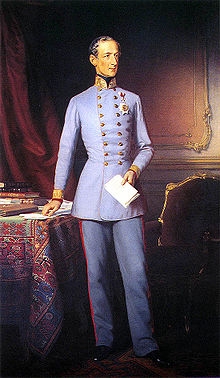Felix, Prince of Schwarzenberg
|
His Serene Highness Prince Felix of Schwarzenberg |
|
|---|---|
 |
|
| 6th Minister-President of the Austrian Empire | |
|
In office 21 November 1848 – 5 April 1852 |
|
| Monarch |
Ferdinand I Franz Joseph I |
| Preceded by | Johann Feirherr von Wessenberg-Ampringen |
| Succeeded by | Karl Ferdinand Graf von Buol (as Chairman of the Ministers' Conference) |
| 5th Foreign Minister of the Austrian Empire | |
|
In office 21 November 1848 – 5 April 1852 |
|
| Monarch |
Ferdinand I Franz Joseph I |
| Preceded by | Johann Feirherr von Wessenberg-Ampringen |
| Succeeded by | Karl Ferdinand Graf von Buol |
| Personal details | |
| Born |
2 October 1800 Böhmisch Krumau, Kingdom of Bohemia, Holy Roman Empire |
| Died | 5 April 1852 (aged 51) Vienna, Archduchy of Austria, Austrian Empire |
Prince Felix of Schwarzenberg (German: Felix Prinz zu Schwarzenberg; 2 October 1800 – 5 April 1852) was a Bohemian nobleman and an Austrian statesman who restored the Habsburg Empire as a European great power following the Revolutions of 1848. He served as Minister-President of the Austrian Empire and Foreign Minister of the Austrian Empire from 1848 to 1852.
Felix was born at Český Krumlov Castle (German: Böhmisch Krumau) in Bohemia, the second son of Prince Joseph of Schwarzenberg (1769–1833) and his wife Pauline of Arenberg. The House of Schwarzenberg was one of the most influential Bohemian noble families; his elder brother Prince Johann Adolf II of Schwarzenberg later initiated the building of the Emperor Franz Joseph Railway line from Vienna to Plzeň (Pilsen), while Felix' younger brother Frederick became Archbishop of Salzburg in 1835 and Archbishop of Prague in 1849.
The nephew of Prince Karl Philipp of Schwarzenberg (1771–1820), commander of the Austrian armies in the last phases of the Napoleonic wars, Schwarzenberg after a short military interlude entered the diplomatic service, where he became a protégé of State Chancellor Prince Klemens von Metternich and served in several Austrian embassies at Saint Petersburg, London, Paris, Turin, and Naples. During his time as a London attaché in 1828 he had an affair with Jane Digby, whom he deserted after causing her then-husband – Edward Law, 1st Earl of Ellenborough – to divorce her, and making her pregnant. This episode led to the nickname of "Prince of Cadland" being applied to him in London.
...
Wikipedia
